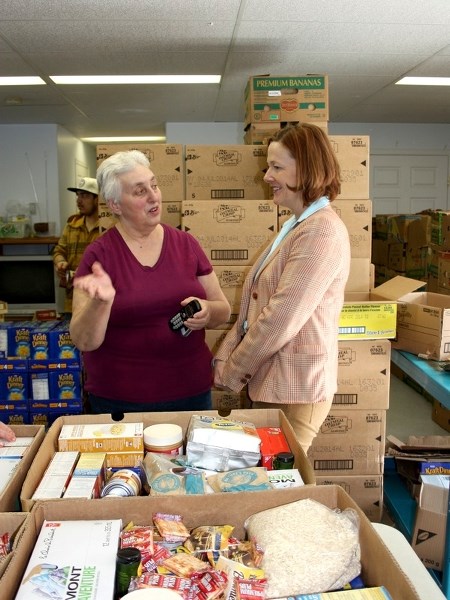The Northern Leaders Summit on March 14 at the Athabasca Regional Multiplex brought together approximately 120 municipal leaders from across northern Alberta, several government ministers and premier Alison Redford to discuss priorities in the region.
“Canada has an incredible jewel in Alberta,” Redford said in an interview after the summit. “We’re certainly the economic engine of the country, and northern Alberta is the economic engine of Alberta. This is where the resources are, and this is where we want to build communities.
“When I’m in Athabasca and Boyle, there’s no doubt that the economy continues to grow,” she added.
Through joint meetings with other leaders and sessions with particular government ministers, northern leaders were able to voice the concerns most affecting their municipalities. The event was hosted by the Northern Alberta Development Council.
Athabasca County Reeve Doris Splane was in attendance and thought it was an excellent opportunity to share northern concerns with policy makers.
“It was a real opportunity that we don’t usually get out in the rural areas,” Splane said. “If they’re not going to hear the grassroots people, then their decisions aren’t based on full information.”
Splane explained each leader was given time to raise their particular concerns. For Splane, that meant voicing the need for an emergency response pilot program in Wandering River and decrying the province’s cuts last year to the transportation grants for bridges specifically. Splane was calling for this funding to be reinstated.
“That is a northern priority,” Splane said. “We have a lot of bridges because of the topography within our municipality.”
While she said the conference was an excellent opportunity, she noted the time given for each leader was limited.
“We were very limited in the time and the amount (of concerns) because you’re in such a big group, and everybody has their concerns,” she said.
“I think the general feeling at the end of the day … it was an excellent idea.” Splane said of the summit, which was the first of its kind.
Outside the doors of the multiplex, Alberta Union of Provincial Employees (AUPE) vice-president Erez Raz and several union members felt differently.
At an information picket near the multiplex, Raz said some of the union members should have been allowed into the invite-only summit.
“We should have been in there in order to know what is going on and maybe voice some of the concerns we have,” he said. “We’re just fed up with the way the government has been dealing with things in rural Alberta.
“It would be a good thing to talk to those living in the community,” Raz added.
Specifically, Raz mentioned cuts to post-secondary funding, which have affected front-line staff at Athabasca University, and the proposed changes to pension plans.
“We hear it on a daily basis: that this government is in trouble and our members will not be voting for the PC government,” he said.
Following a tour of the Good Samaritan Mission and Food Bank later in the afternoon, Redford addressed some of the northern concerns, in particular a pipeline training centre in Boyle. While she offered no timeline for its creation, Redford addressed the importance of such a centre.
“(It’s important) for creating even more skilled jobs and skilled people in this part of the world,” she said.
She also touched on the construction of a family care clinic in Athabasca, though again, she offered no sense of when locals might expect to see construction.
“That’s an important part of the partnership that the community and Alberta Health Services and our government is putting in place,” Redford said. “It’s a very important part of what we think is important in health care.”
Redford also spoke of the new school in Athabasca, brushing off any criticism of the P3 model, a system that aims to share infrastructure costs for items like schools with the private sector to secure a better interest rate on loans.
The Wildrose Party recently stated that the P3 model for constructing schools has failed, citing a lack of contractor interest in such projects.
“We know that in the political rhetoric that there’s other political parties that think it’s not important to build that infrastructure. We believe that it is,” said Redford. “There’s no doubt in my mind that Albertans want this and people in Athabasca need this school, and I’m really not concerned about what the opposition might think, because they change their minds from day to day.”


